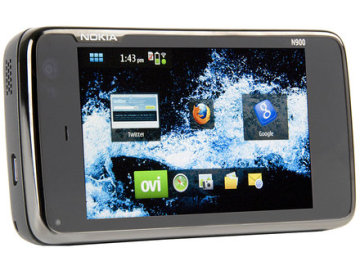MeeGo: Nokia, Intel unite software in battle for smartphones and netbooks

MWC 2010: Maemo and Moblin 2 get together under new banner
Nokia and Intel are merging their open source platforms, Maemo and Moblin 2, into a single open source plaform for high-end mobile devices such as smartphones, netbooks and tablets.
Speaking in Barcelona, the city currently hosting the Mobile World Congress (MWC) conference, Renee James, Intel's senior VP and general manager of software and services group, said the two open source efforts will merge into one fully open sourced Linux platform - to be called MeeGo.
"MeeGo blends the very best of Moblin and Maemo software into one Linux-based computing platform," said James.
Moblin was launched by Intel back in 2008 as a platform for devices such as netbooks - where it is now available on a handful of such devices - and mobile internet devices (MIDs), a form factor largely forgotten in the wake of recent explosion in mini-laptops.
Maemo meanwhile was initially conceived as an OS for Nokia's mini-tablet range. However, it was subsequently ported onto mobile devices last year with the N900 - a mobile tablet which comes with 3G connectivity and a smartphone in all but name.
While Nokia has traditionally been the biggest seller of smartphones - currently holding some 40 per cent of the smartphone market thanks to its Symbian OS - it has been faced with the prospect of Apple's iPhone and Google's Android increasingly winning the hearts and minds of consumers and developers. Consequently, it has changed tack, making Maemo its platform of choice for high-end smartphones in an attempt to maintain its grip on the market.

The Nokia N900, running Maemo
(Photo credit: Nokia)
The Maemo-Moblin union will see the combined platform take Intel and Nokia's software to pastures new.
A wide range of devices will be targeted by MeeGo, according to James - from "pocketable mobile computing devices" to larger form factors such as netbooks, tablets, connected TVs, media phones and in-vehicle entertainment systems.
The new initiative must keep focused if it is to be a success, according to Forrester Research principal analyst Ian Fogg.
"They have lots in common: Both are Linux-based; both predominantly target mobile devices; both aim to deliver outstanding rich consumer internet experiences; and both have been more talk than action to date. Nokia needs to shift step quickly from talking to walking and even better running or the high end market in Europe will be dominated by the same players as in North America and Nokia will have to pursue a winback strategy," he wrote on his blog.
"The aims for this new initiative are lofty but execution must match these ideals with both quality and speed. MeeGo must not allow the desire to implement this software on a very wide range of devices - in-car entertainments; smartphones; netbooks; tablets etc, etc - to distract them from gaining rapid traction in the mobile market," Fogg added.
Intel's James said the Qt applications framework for software developers will also be included in MeeGo - allowing developers to write apps once but deploy them across a range of MeeGo devices.
Apps will also be transferable across the hardware supported by the platform, according to Nokia's executive VP of services, Kai Oistamo. "Because MeeGo can...
...run on many different devices people will be able to keep their favourite apps whenever they change their devices," he said.
"By combining Maemo and Moblin we are going to reduce fragmentation and complexity," he added. "But this is also a unification of the way applications are developed for multiple devices within a single ecosystem."
In a thinly-veiled dig at iPhone and iPad maker Apple, Oistamo added: "The apps and other content will not be locked into one company's devices or a walled garden - rather we see MeeGo's ecosystem more as a open frontier. No walls, no fences."
The announcement comes eight months after the two companies annouced a long-term strategic partnership to collaborate on software and hardware.
"We committed then that we would be collaborating on future mobile devices and chipset architectures, and to co-ordinate our efforts on open source projects," said Oistamo.
"The continued convergence of the internet, the mobile communications industry and the computer industry is not going to slow down," James added. "It's that convergence that's bringing the opportunities for this entire new class of devices that span across different segments of computing."
Asked whether the birth of MeeGo means the end of Symbian - another of Nokia's open source initiatives and historically its mobile OS of choice - Oistamo said: "Absolutely not."
"MeeGo will co-exist with Symbian and [they will] complement one another," he added. "Symbian will continue to be the broad availability of smartphone features and functionality to more and more people around the world."
The first release of MeeGo will be available in the second quarter of this year, according to the pair.